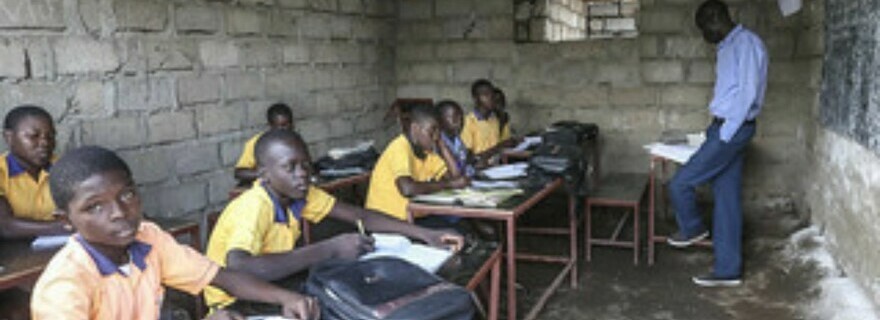Teachers and parents are expressing a range of opinions regarding the indefinite closure of schools mandated by South Sudan’s government.
Last week, the Ministries of Health and General Education jointly announced the closure of schools due to an anticipated heatwave, with temperatures expected to soar between 41 and 45 degrees Celsius over the next two weeks in the capital, Juba, and other regions of the country. The directive warned that any school found operating during this period would risk having its registration revoked.
The rationale behind this decision, according to the ministries, is to protect students from heat-related illnesses such as meningitis. Health Minister Yolanda Awel Deng advised parents to ensure their children stay indoors and remain hydrated.
In interviews carried out by Radio Tamazuj on Tuesday, several parents and teachers in Juba shared their diverse perspectives on the matter.
Manase Nyombu, a father of five, supported the government’s decision to close schools in light of the recent surge in heatwaves. Nyombu highlighted that the original academic calendar of the former Sudan, where schools typically opened in April, was largely influenced by the intense heat in Juba.
He praised the government for its proactive approach in closing schools, noting, “Before the government issued the closure order, I had been contemplating the issue. Many schools lack adequate ventilation and cooling systems.”
Nyombu expressed concerns about the impact of the heat on children, particularly in schools with small, poorly ventilated classrooms. He emphasized the importance of aligning the school calendar with historical practices to mitigate the effects of the hot season.
Alfred Lasuba, another parent, also commended the government for closing schools, citing it as a necessary safety measure, especially for children, particularly those in lower grades. He emphasized, “The decision to close schools is a positive one. The current heatwave is severe, particularly for children, and it poses health risks.”
Lasuba urged parents to support their children at home by engaging them with educational activities during this break.
Kenyi Jimmy, the headmaster of Brilliant Mission Nursery and Primary School, welcomed the school closures, acknowledging the impact on the academic calendar. However, he emphasized that the government’s decision prioritizes the safety of students.
According to Jimmy, the government’s decision serves the public interest, recognizing the heatwave as a natural occurrence. He expressed appreciation for the government’s communication, stating, “We greatly value the information provided by the government, as it benefits our community.”
While acknowledging the abruptness of the announcement, Jimmy stressed its importance. He noted, “As educators, we recognize the significance of the government’s directive. The current high temperatures are causing discomfort for students, unlike previous years.” Furthermore, Kenyi urged teachers to utilize this school closure period to prepare lessons that would have been covered during normal circumstances.
The Ministry of General Education and Instruction made adjustments to the school calendar earlier this year. The first term began on February 5, 2024, and concluded on May 10, 2024. The second term is scheduled to commence on May 27 and end on September 6, with the third term starting on September 23 and concluding on December 20, 2024.
Kenyi, however, proposed that once schools reopen, teachers should utilize programs such as extra lessons and weekend classes to make up for lost time and align with the academic calendar. “I urge fellow teachers across South Sudan to utilize this holiday effectively. As educators, we have a responsibility to ensure continuity in learning. Lessons that were missed can be simplified and covered through extra learning programs, perhaps even on weekends,” he emphasized.
Kenyi also stressed the importance of parental involvement in supporting children’s education both formally and informally at home. He appealed to parents to guide their children away from negative influences, stating, “Parents with some knowledge can play a significant role in supporting their children’s education at home. They shouldn’t allow their children to wander aimlessly in the community.”
However, Wani Sosten Noel, the head teacher of Rainbow Nursery and Primary School, a private institution, expressed concerns about the unexpected holiday break disrupting lesson plans. He suggested that it would have been preferable for the Ministry of Education to adjust class schedules, allowing for teaching during cooler hours, such as from 7 a.m. to 10 a.m.
Wani emphasized the need for schools to be adequately ventilated and equipped with fans to ensure a conducive learning environment. He highlighted the importance of consulting stakeholders, including educators, to address challenges effectively.
Regarding the heatwave, Wani recommended practical solutions such as installing fans in classrooms lacking proper ventilation. He emphasized, “Schools without fans and adequate ventilation should consider installing fans or adjusting schedules to ensure learning can continue comfortably, perhaps starting classes earlier, from 7 a.m. to 10 a.m.”
Wani disclosed that his school is developing a holiday package to facilitate continued learning at home until classes resume. Additionally, he urged students to follow the Ministry of Health’s guidelines to stay safe during the heatwave.




